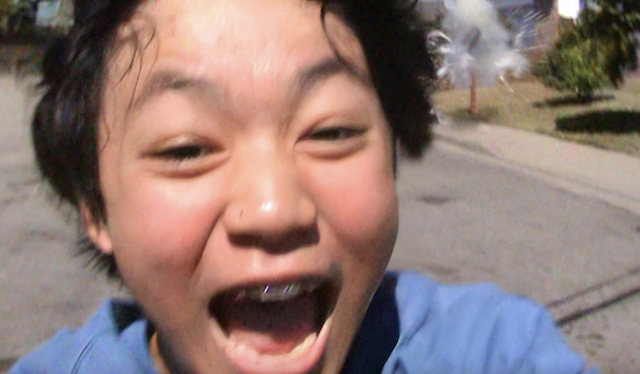
Sundance has paved the way for Asian American cinema in recent years. As a result, films like “The Farewell,” “Minari” and this year’s “Past Lives” have all garnered Oscar nominations. Now at the just-ended 2024 edition, director Sean Wang won the Audience Award: U.S. Dramatic at the Sundance Film Festival for his debut feature “Dìdi.”
Taking place in Fremont, California in 2008, Wang’s promising career starter is a semi-autobiographical coming-of-age story that demonstrates how boys can act cruelly and erratically towards each other. This is beautifully depicted from the start through a shaky-filmed scene of a character running away from an exploding mailbox in the opening sequence.
Wang recounts some of his most adventurous childhood memories through his fictional counterpart, Chris Wang (played by promising young actor Izaak Wang). With braces and an acne-ridden face, he is referred to as Didi by his family. In Mandarin, “Dìdi” can be either “little brother” or a term of endearment for a family’s youngest son.
While Chris’ father is away working in Taiwan, the fragile and hormone-infused Chris — fresh out of middle school — lives with his sister Vivien (Shirley Chen) who is departing for college. Constantly bickering with her, they inflict outrageous pranks on each other, he also has developed an interest in a prank video on YouTube.
His mother, Chunsing Wang (played by veteran actor Joan Chen), is struggling to balance her responsibilities as a stay-at-home mom with caring for her mother-in-law, Nai-Nai. Director Wang’s actual grandmother, Chang Li Hua, plays Chris’s doting paternal grandmother.
“Dìdi” recalls the era of first-generation social media. Integrating AIM, Myspace, and Facebook in the film showed how this new technology impacted on the social dynamics of teenagers and beyond. Its depiction of the transitional period between middle and high school displays similar elements to Bo Burnham’s “Eighth Grade,” which revolved around computer screens and social media. Chris’ interaction with his crush Madi (Maháela Park) provides an illustration as to how he struggles to speak and interact with girls — not his strong suit.
Upon signing up for tutoring classes held in an Asian family friend’s garage, Chris discovers himself attracted to a new group of cool kids who skate around the neighborhood. He ends up volunteering to film their tricks. As Chris fixates on a new kid on the block, the film slowly retreats from home as the tensions between his mother and Nai Nai intensify. Wang’s acting throughout the film is naturalistic, revealing genuine vulnerability at times. Through actor Izaak Wang, Chris utters responses that pierces his friends and family’s hearts.
In “Dìdi,” director Wang effectively captured the feelings of shame and inadequacy when being left out, making it comprehensible to anyone who has faced similar experiences growing up as a 13-year-old. Many teens speak one language at home and another at school. Even though the film is loosely structured as a teen comedy, it’s realized in both an authentic and charming way. Wang displays an edginess in his direction; his ability to balance a naturally comedic sensibility with serious insights into the process of figuring out one’s own identity is remarkable.
In the priceless moment when Chris wooed Madi by telling her that his favorite film was a Mandy Moore weeper (“A Walk to Remember”), “Dìdi” brings us back to our jittery teenage years, where we first checked out social media, AIM, and wooed crushes at the same time.
Grade : B+

